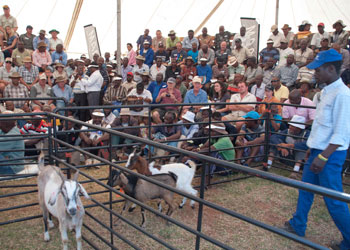Story by Claire Hawkridge | Resource Development Officer | Heifer South Africa
Photo Courtesy of Heifer South Africa
 Heifer South Africa attended a goat auction March 7, 2013, at Msinga in KwaZulu-Natal. The auction, run by AAM livestock agents and auctioneers with the Mdukatshani Rural Development Programme (MRDP), was one of the first indigenous goat auctions in the country and the first time in KwaZulu-Natal that local, smallholder, indigenous goat farmers had the opportunity to sell their livestock through a formal and fair auction process.
Heifer South Africa attended a goat auction March 7, 2013, at Msinga in KwaZulu-Natal. The auction, run by AAM livestock agents and auctioneers with the Mdukatshani Rural Development Programme (MRDP), was one of the first indigenous goat auctions in the country and the first time in KwaZulu-Natal that local, smallholder, indigenous goat farmers had the opportunity to sell their livestock through a formal and fair auction process.
Goat farming represents an important livelihood strategy for many rural families in South Africa. Yet this sector of the agricultural market is underdeveloped with most farmers buying and selling goats only informally and often engaging in bartering, which sometimes results in their livestock being significantly undervalued. In some of the areas where Heifer works, goats?which should be worth 1000 to 1200 South African rands, or about $110 to $132?are sometimes exchanged for much less valuable items, such as a wheelbarrow (approximate value 500 rands, or about $55).
An auction provides a process to establish the market value of a goat by bringing together buyers and sellers in a fair process. Auctions of this type also set general prices in an area, establishing the price a farmer should be able to earn from his or her goats. Each individual farmer brings goats to present to buyers. Local, small-scale farmers are able to purchase goats, but the auction is also open to companies, organizations like Heifer and commercial farmers. The Msinga auction involved 150 local farmers selling 548 goats and 70 registered buyers. All goats were sold and the auction saw a turnover of 533,000 rands, or about $58,461.
The auction had the strong support of the Departments of Agriculture and Rural Development. Heifer representatives were happy to attend the event, not only to learn about the auction process but also to purchase 83 goats for the Phuhlisanani Project. Heifer has, for several years, been trying to find a way to purchase livestock primarily from smallholder farmers. Auctions like this are a great opportunity for organizations like Heifer, as well as large scale-commercial farmers, to buy goats while also supporting small-scale farmers.
The auction was not without challenges. The check system took a long time to process, so the last payments were made late into the night. The cost of setting up temporary animal pens was high. There were also some problems with animals that were not tagged. Overall, however, the event was a wonderful first step towards developing this very important market. The next goat auction is scheduled for November and MRDP, the Department of Rural Development and other stakeholders are working to ensure that it will be even more successful.
Heifer South Africa is a non-profit, community development organization that partners with communities to end hunger and poverty in South Africa and care for the Earth. Heifer uses agricultural interventions to help poor, rural families to become self-reliant. Through Heifer International’s Passing on the Gift® concept, those who receive livestock, training, seeds and trees pass on (donate) the equivalent of what they have received to another family?recipients becoming donors and families helping others in their own communities. Heifer also works with farmers in order to help them to develop and formalize their farming activities and to link farmers with markets where they might find buyers for their livestock and produce.